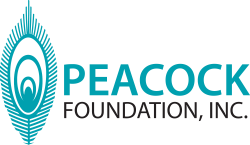Conflict of Interest Policy
Peacock Foundation, Inc. (PFI) has consistently maintained the highest code of conduct in all its operations by avoiding any conflict of interest or the appearance of any conflict of interest on the part of its Board of Directors and members (Board) and staff, in making grants and in soliciting or providing goods and services.
In recognition of its responsibility to the public trust, the Board of Directors of PFI desires to adopt a written statement of the conflict of interest policy and to establish appropriate procedures to ensure that the policy is followed.
A conflict of interest may exist when the duty or loyalty to PFI can be prejudiced by actual or potential benefit from another source. It is the policy of PFI that no Board member or staff shall derive any personal profit or gain, directly or indirectly, by reason of his or her service to the Foundation.
No Board member, staff, or consultant shall receive any special consideration whatsoever by the Board of Directors, or receive any private inurement from PFI or its service providers or grantees. No variation in the procedures or standards for processing grants or entering into contracts shall be permitted. Instead, particularly thorough scrutiny, judgment and consideration shall be applied to all such matters.
Confidential financial and investment information may not be used for personal gain. No Board member, staff, or consultant should use such confidential information for personal purposes or transmit such information to others except in the course of his or duties on behalf of PFI.
Board members and staff of PFI are encouraged to play active roles in their communities by serving as board members or otherwise being involved with a wide spectrum of nonprofit organizations. This means that, from time to time, potential conflicts of interest or the appearance of such conflicts will inevitably arise. It is the foundation’s policy to deal with such conflicts in as open and appropriate a way as possible, through complete disclosure.
When connections, no matter how remote, of the individuals who participate in decisions are fully disclosed, any misunderstanding or later charges of concealment can be avoided. Some conflicts, once disclosed, turn out not to be conflicts at all; others cannot be cured by disclosure. In either situation, as soon as the issue in question is raised and a possible conflict is known, the conflict should be made a matter of record by disclosure to the Chairman.
Under obligation to the Foundation, his or her fellow staff, and the community, each Board member and staff shall file with the Chairman each year a list of any position he or she holds or of any businesses or avocational activity which may result in a possible conflict of interest or bias for or against a particular grantee, action, or policy. Changes during the year must be reported.
Any Board member, officer, staff, or consultant having an interest, financial or otherwise, in a contract or other transaction presented to the Board of Directors for approval shall give prompt, full and frank disclosure of the material facts as to the relationship or interest to the Board of Directors prior to its acting on such contract or transaction. In case of such conflicts or the appearance thereof, disclosure of the conflict should be made prior to making any related grant decisions. Once such a disclosure has been made, the remaining Board members will determine whether or not there is a potential conflict of interest.
When the Board, staff, or consultant is to decide upon an issue about which a member has an unavoidable conflict of interest, that member shall physically absent herself or himself without comment from not only the vote, but also from the deliberation, unless directly requested by the Chairman of the Board to provide factual information or answer factual questions that may assist the Board in making a wise decision. In no case shall that member vote on such matter or attempt to exert personal influence.
Such person may be counted in determining the existence of a quorum at any meeting where the contract or transaction is under discussion or is being voted upon. In any situation in which a majority of members of the Board of Directors is disqualified because of PFI’s conflict of interest policy, the Board, after full disclosure of the potential conflicts, may by a two-thirds vote of all of the Directors then holding office, suspend the conflict of interest policy and proceed to vote upon the proposed grant or contract.
The minutes of the meeting shall reflect the disclosure made, the vote thereon and the abstention from voting of any interested party. All discussion and action with respect to actual or potential conflicts of interest shall be duly entered into the minutes of the meeting where such matters are discussed or resolved.
In any situation not specifically covered by the previous paragraphs, all will carefully consider any potential conflict of his or her personal interests with the interests of the Foundation and will refrain from any actions which might result in an actual or apparent conflict of interest. Any Board member, staff, or consultant who is uncertain about the appropriate behavior in a specific situation is encouraged to seek guidance from the Chairman.
Each member has the affirmative responsibility to report promptly to the Chairman or Executive Director any and all knowledge of any action or conduct that appears in violation of these policies.
Signed by members of the Board of Directors, October 24, 2003.
